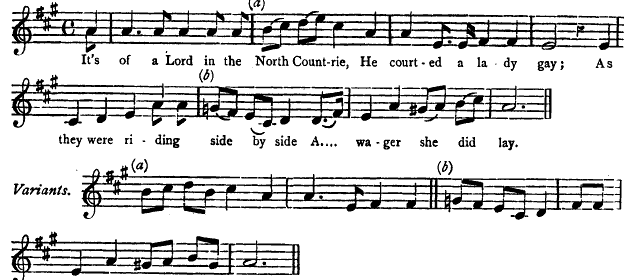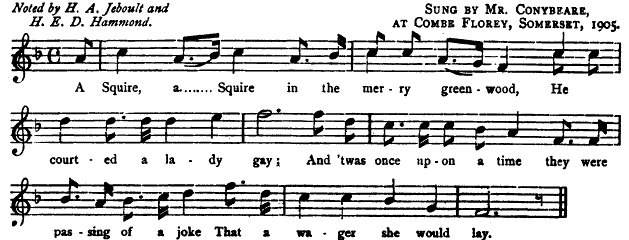The Merry Broomfield- Perry (Cheddington) 1906
[Footnotes in blue were added to the notes instead of at the end of each page. Included are two tunes and one complete text. The tune supplied by Gilcrest "Bonny Broom" is related slightly to the second melody. ]
From:
Narrative Ballads
by Lucy E. Broadwood, A. G. Gilchrist, Frank Kidson
Journal of the Folk-Song Society, Vol. 7, No. 27 (Dec., 1923), pp. 31-40
I. - THE MERRY BROOMFIELD [BROOMFIELD HILL]
FIRST TUNE
Noted by H. E. D. Hammond. SUNG, BY MRS. PERRY, AT CHEDDINGTON, JUNE, 1906.
MIXOLYDIAN INFLUENCE

1. It's of a Lord in the North Count-rie,
He court- ed a la dy gay;
As they were ri - ding side by side
A.... wa - ger she did lay.
2 "I'll bet to you five hundred pounds,
Five hundred pounds to one,
That a maid I will go to a merry green wood
And a maid I will return."
3 When she arrived to a merry green wood
Her love lay fast asleep,
With a grey nag and a silver saddle on
And a greyhound under his feet.
4 Three times she rode around his head,
Six times around his feet,
Nine times she kissed his cherry, cherry cheek
As he lay fast asleep.
5 She took the ring off her right hand,
Put it on his left hand,
To let him know she had a-been there-
And so quickly gone again.
6 When he woke out of his sleep
The birds began to sing,
Saying " Awake, awake, awake, Master!
Your true love's gone again! "
7 " I wish my love was back again,
Was back again! " he cried [cried he]
" Then all the birds of the merry green wood
Should have their fill of she ! "
For other tunes (practically all distinct from one another) and texts, see Journal, Vol. iii, p. 69 (with a Dorian tune noted by Mr. Hammond in Dorset), and Vol. iv, pp. 110-115, where there are also full references concerning the ballad. The foregoing Dorset text is very incomplete and leaves out some of the chief points, viz. the sleeping-draught given by the lady to the squiire; her use of the magical broom-sprig as he lies sleeping; and his dialogue with his "nag" and greyhound who, in fuller versions, are blamed by their master for not arousing him, and explain that they did their best. However, in this fragment the birds converse with him (a ballad-device of great antiquity) and in verse 4 [See also the Somerset text in Journal, Vol. iv, p. 22.] there is a very interesting survival of the magical, mystical "Triple Threes " which from Pythagoras' time down to the present day have played so important a part in the symbolism of the Western World, including that of bodies so dissimilar as the Roman Church and the Masonic Fraternities. The second tune in this Journal is closely allied to that in Vol. iv, p. II4. It was noted, also in Somerset, by Mr. Sharp who took down twelve variants of the same air in that county. The text differs but little from Mr. Sharp's, except for one extra verse which runs:
She took the ring from her little finger,
She placed it on his right hand,
That he might know when he awoke
That his love had been there and gone.
That a ballad so full of magic should have survived in Somerset and Dorset is not surprising in the light of Miss M. A. Murray's anthropological study The Witch-Cult of Western Europe (I92I), where a mass of documents prove how wide-spread the cult was in those counties throughout long centuries, and how persistent and organised it still was, there, in the latter part of the seventeenth century.
In Minstrelsy of the Scottish Border there is a "Broomfield Hills" version with fourteen verses, but no tune. Scott and Buchan "dressed up" their traditional material so freely that it is unfortunately impossible to tell whether their "Broomfield Hill " original contained the verses which seem peculiar to their texts. These introduce an old "witch-woman" who instructs the lady what spells to work with the broom-sprig, her magic circles and finger-rings. Child devotes much attention to the history of this ballad, and raises the question, which tormented the mind of William Chappell, as to a possible connection between the " Broom, broom on hill " mentioned in The Complaynt of Scotland (I549) and in Laneham's Letter from Kenilworth (I575) and the various later and traditional " bonny broom " ballads. Chappell, unable to identify the tune of " Broom, broom on hill"; rather confusedly goes off into presenting a mistaken theory of his concerning "The Broom of Cowdenknowes" [he was not aware that Cowdenknowes is a beautiful property famliar to all who know Tweedsade. Allan Ramsay gives a version of the ballad, without music, in his Tea Tabel Miscellany (1724).- L. E. B.] ; and it is not made clear by him whence he has taken his tune "O the broom etc. of Cowdenknowes " which he states to be more than seventy years older than a superier version in The Beggar's Opera and Thomson's Orpheus Caledonius (I725). As Chappell's tune may possibly have had a common origin with the favourite Somerset " Merry Broomfield" air (a variant of which is here given) it is quoted for comparison, in case it should help towards tracing the long-sought sixteenth century song.
Mr. Frank Kidson does not think that "The Merry Broomfield" has any connection with "Broom on Hill" or with "The Broom of Cowdenknowes," and refers us to The Dancing Master (from i650 to I698,) and Musick's Delight on the Cithren (I666) for a tune entitled " Broom, the bonny, bonny broom."- L. E. B.
THE MERRY BROOMFIELD
SECOND TUNE

A Squire, a... Squire in the mer- ry green - wood,
He court ed a la - dy gay;
And 'twas once up - on a time they were pas - sing of a joke
That a wa- ger she would lay.
33- O, THE BROOM, THE BONNY, BONNY BROOM.
(THE BROOM OF COWDENKNOWES).

The second tune above has a good deal of resemblance to the old tune "The Mermaid "* (" One Friday Night as we set sail ") as found in popular collections, such as John Farmer's Gaudeamus.-A. G. G.